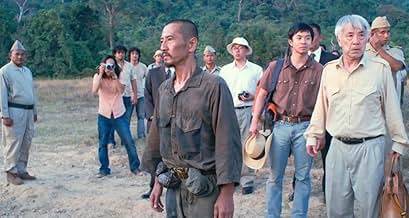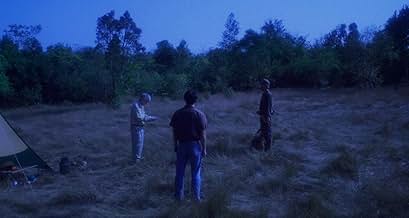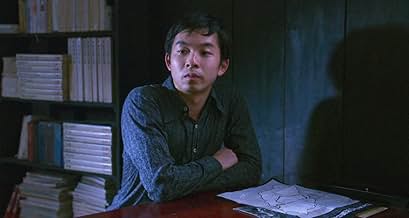AVALIAÇÃO DA IMDb
7,2/10
3,3 mil
SUA AVALIAÇÃO
Quando o Japão se rende no final da Segunda Guerra Mundial, o soldado Hiroo Onoda se retira para as selvas das Filipinas para continuar a guerra ele mesmo por outros dez mil dias.Quando o Japão se rende no final da Segunda Guerra Mundial, o soldado Hiroo Onoda se retira para as selvas das Filipinas para continuar a guerra ele mesmo por outros dez mil dias.Quando o Japão se rende no final da Segunda Guerra Mundial, o soldado Hiroo Onoda se retira para as selvas das Filipinas para continuar a guerra ele mesmo por outros dez mil dias.
- Direção
- Roteiristas
- Artistas
- Prêmios
- 5 vitórias e 20 indicações no total
Yûya Endô
- Hiroo Onoda - Young
- (as Endô Yûya)
Kanji Tsuda
- Hiroo Onoda - Old
- (as Tsuda Kanji)
Yûya Matsuura
- Kinshichi Kozuka - Young
- (as Matsuura Yûya)
Tetsuya Chiba
- Kinshichi Kozuka - Old
- (as Chiba Tetsuya)
Shinsuke Kato
- Shôichi Shimada
- (as Katô Shinsuke)
Kai Inowaki
- Yûichi Akatsu
- (as Inowaki Kai)
Issei Ogata
- Major Yoshimi Taniguchi
- (as Issey Ogata)
Taiga Nakano
- Norio Suzuki - The Tourist
- (as Nakano Taïga)
Nobuhiro Suwa
- Tanejirô Onoda - Onoda's Father
- (as Suwa Nobuhiro)
Mutsuo Yoshioka
- Captain Hayakawa
- (as Yoshioka Mutsuo)
Tomomitsu Adachi
- Governor-General Shigenori Kuroda
- (as Adachi Tomomitsu)
Kyûsaku Shimada
- Lieutenant Suehiro
- (as Shimada Kyûsaku)
Jemuel Satumba
- Filipino Prisoner
- (as Jemuel Cedrick Satumba)
Ryû Morioka
- Student
- (as Ryu Morioka)
Akira Morita
- Extra
- (as Morita Akira)
- Direção
- Roteiristas
- Elenco e equipe completos
- Produção, bilheteria e muito mais no IMDbPro
Avaliações em destaque
Hiro Onoda is talked of in WW2 history as being the last Japanese soldier to surrender; 29 years after the end of WW2 in 1945 (1946 for total end for Japan) on the Philippine island of Lubang. I often wonder why they chose him as the one who got the most attention, story's and films. This is because he was not the last Japanese soldier of WW2 to surrender.
That particular piece of history belongs to Teruo Nakamura who lived for 30 years in the jungle of Morotai; in the old Dutch East Indies. I found out it was because he was treated disgustingly by the Japanese government of the time in 1974 and, that they did not consider him worthy of Japanese soldier honours. This was because his real name was Attun Palalin and he came from ethnic 'Amis', as a native of Taiwan, which was then called Formosa Island, before World War II became a colony of the Japanese Empire.
They and over a 100 others were found scattered on various islands, still fighting years after the end of the war. The last most recent discovery is of 2 soldiers aged 83 and 86 who were found 60 years after the wars end.
I'm sure that there were probably a good many who were never found and that is a shame the Japanese will have to bear forever. It is good that story's such as this come to light and allow later generations to realize the sheer futility of war. The only negative to this film was it being at least an hour too long (it runs for 2:46 minutes) and, very slow paced and a personal belief that this did not follow his story as written in his daily diary of events.
R. I. P. To all of those brave men, lost souls and survivors and also, to any other nationality soldiers who were left behind and stranded on ex island military bases.
To hell with Russia's Vladimir Putin and his attempt to take back what Russia wrongly stole after WW2. The Ukraine is 'Not Gonna Take It' and a lot of Russian families will once again suffer the wasted loss of loved ones.
That particular piece of history belongs to Teruo Nakamura who lived for 30 years in the jungle of Morotai; in the old Dutch East Indies. I found out it was because he was treated disgustingly by the Japanese government of the time in 1974 and, that they did not consider him worthy of Japanese soldier honours. This was because his real name was Attun Palalin and he came from ethnic 'Amis', as a native of Taiwan, which was then called Formosa Island, before World War II became a colony of the Japanese Empire.
They and over a 100 others were found scattered on various islands, still fighting years after the end of the war. The last most recent discovery is of 2 soldiers aged 83 and 86 who were found 60 years after the wars end.
I'm sure that there were probably a good many who were never found and that is a shame the Japanese will have to bear forever. It is good that story's such as this come to light and allow later generations to realize the sheer futility of war. The only negative to this film was it being at least an hour too long (it runs for 2:46 minutes) and, very slow paced and a personal belief that this did not follow his story as written in his daily diary of events.
R. I. P. To all of those brave men, lost souls and survivors and also, to any other nationality soldiers who were left behind and stranded on ex island military bases.
To hell with Russia's Vladimir Putin and his attempt to take back what Russia wrongly stole after WW2. The Ukraine is 'Not Gonna Take It' and a lot of Russian families will once again suffer the wasted loss of loved ones.
What a good surprise this film directed by a French and speaking of the war in the Pacific from the Japanese point of view. So unexpected and awesome in the same time. I could not believe that this young director is not under the influence of Clint Eastwood's LETTERS FROM IWO JIMA, John Boorman's HELL IN THE PACIFIC or Kon Ichikawa's FIRES IN THE PLAINS. Impossible for me to think that he would have never heard of those three iconic films. Back to this one, I don't know how anyone could say harm about it, except maybe a bit too long; yes, maybe. Plus, it speaks not only of the japanese soldiers, but not the kamikaze or simple fighters, but some kind of secret section of soldiers sent into a Philippines Island. The young director from France is also aware of the Mizoguchi's influence and with the poetic lines of the Japanese spirit. Good film to be watched at any cost. Only for this incredible but so authentic story.
In anticipation of the Allied landings on the Philippine island of Lubang, the Japanese send a small squad to engage in some guerrilla warfare activities pending the reorganisation of their own troops ready to return in due course. Amongst these men is the young Lt. Hiroo Onoda. He is an idealistic young man who firmly believes in his cause and is determined to do what he can, for as long as he can. Now what we know from the outset is that his nation surrenders in 1945, one year after these troops are deployed - but nobody tells Onoda. With his small squad still patrolling the island, their team begins to fracture. Their discipline to fail. The relentless monsoon rains; disease and the activities of the locals begin to reduce their number but he is adamant that he will stay on duty for as long as it takes - even if that takes us into the 1970s. Both Yûya Endô as the younger man and Kanji Tsuda as the older one play their parts convincingly as the story, based on real facts, illustrates the tough life amidst the dense jungle where they are seemingly abandoned by their own side and left to their own, limited, devices. The story mixes the timelines so we skip from young to older, and that's quite effective at breaking up the story to avoid it being just a straightforward chronology. It also uses the other characterisations to demonstrate the increasing frustrations of these men as personalities clashed and loyalties, and authority, is tested. As we proceed their's becomes more of a brotherhood than an army unit, and that makes the tragedies and misfortunes that befall them all the more poignant. It's history, so there isn't much latitude as to the denouement, but when we do get there it's quite a touching conclusion that seems just a bit rushed, but entirely fitting.
Felt it is a bit too long in several scenes particularly early on, but watched it very smoothly due to the great story line.
Actors are all very impressive. Performance by Taiga Nakano was a relief in otherwise very serious picture.
Director Arthur Harari should deserve an admiration creating all Japanese language picture despite limited business prospect.
Ken Kai.
Actors are all very impressive. Performance by Taiga Nakano was a relief in otherwise very serious picture.
Director Arthur Harari should deserve an admiration creating all Japanese language picture despite limited business prospect.
Ken Kai.
Greetings again from the darkness. There has been no shortage of conspiracy theories, either recently or historically, that have left non-believers bewildered at how 'the other side' held firm. Writer-director Arthur Harari and his co-writers Bernard Cendron and Vincent Poymiro bring the remarkable struggle of Hiroo Onoda to the screen. Onoda was a Japanese soldier who refused to believe WWII ended, and instead, continued his mission of resistance by spending thirty years in a Filipino jungle.
Onoda was only 22 when he entered the war in 1944. He is played as a young man by Yuya Endo, and in later years by Kanji Tsuda. The film goes mostly in chronological order, with only occasional flashbacks to Onoda's "special training" by Taniguchi (Issey Ogata), his trainer and trainer. The passing of years is noted on screen, and we watch as Onoda's squadron shrinks in size, holding at four for quite a while, before shifting to two, and finally only he remains. During the special training, Taniguchi declares, "You don't have the right to die", instilling a firm commitment to the cause in Onoda.
Also seared into Onoda's brain is the proclamation of, "We'll come back for you. No matter how long it takes, we'll come back for you." Still, it's fascinating to see his determination to keep fighting, despite so many signs that the war was over. He viewed magazine articles and radio broadcasts as tricks to draw him away from his mission ... going so far to decipher a coded message that was anything but that.
The young man who finally succeeds in lulling Onoda out of the jungle has his own mission - actually three of them: finding a panda, locating Onoda (by this time a legend), and tracking down a Yeti. It's a bittersweet moment for the long-dedicated soldier, and he went on to live many more years as a home country icon - considered a nationalist man of honor by some, a murdering fool by others. The film, and Onoda's saga, makes us question the point of war when it's impossible to tell if the war is over or ongoing. Harari's film is almost three hours, which is entirely too long ... but significantly shorter than the time Onoda spent in the jungle.
Releasing in theaters on October 14, 2022.
Onoda was only 22 when he entered the war in 1944. He is played as a young man by Yuya Endo, and in later years by Kanji Tsuda. The film goes mostly in chronological order, with only occasional flashbacks to Onoda's "special training" by Taniguchi (Issey Ogata), his trainer and trainer. The passing of years is noted on screen, and we watch as Onoda's squadron shrinks in size, holding at four for quite a while, before shifting to two, and finally only he remains. During the special training, Taniguchi declares, "You don't have the right to die", instilling a firm commitment to the cause in Onoda.
Also seared into Onoda's brain is the proclamation of, "We'll come back for you. No matter how long it takes, we'll come back for you." Still, it's fascinating to see his determination to keep fighting, despite so many signs that the war was over. He viewed magazine articles and radio broadcasts as tricks to draw him away from his mission ... going so far to decipher a coded message that was anything but that.
The young man who finally succeeds in lulling Onoda out of the jungle has his own mission - actually three of them: finding a panda, locating Onoda (by this time a legend), and tracking down a Yeti. It's a bittersweet moment for the long-dedicated soldier, and he went on to live many more years as a home country icon - considered a nationalist man of honor by some, a murdering fool by others. The film, and Onoda's saga, makes us question the point of war when it's impossible to tell if the war is over or ongoing. Harari's film is almost three hours, which is entirely too long ... but significantly shorter than the time Onoda spent in the jungle.
Releasing in theaters on October 14, 2022.
Você sabia?
- CuriosidadesWhilst set on a remote Philippines Island the film was in fact shot on location in the kingdom country of Cambodia.
Principais escolhas
Faça login para avaliar e ver a lista de recomendações personalizadas
- How long is Onoda: 10,000 Nights in the Jungle?Fornecido pela Alexa
Detalhes
- Data de lançamento
- Países de origem
- Centrais de atendimento oficiais
- Idiomas
- Também conhecido como
- Onoda: 10,000 Nights in the Jungle
- Locações de filme
- Bokor National Forest, Camboja(jungle)
- Empresas de produção
- Consulte mais créditos da empresa na IMDbPro
Bilheteria
- Orçamento
- € 4.530.000 (estimativa)
- Faturamento bruto mundial
- US$ 262.276
- Tempo de duração2 horas 53 minutos
- Cor
- Proporção
- 1.85 : 1
Contribua para esta página
Sugerir uma alteração ou adicionar conteúdo ausente

Principal brecha
What is the Canadian French language plot outline for Onoda - 10 Mil Noites na Selva (2021)?
Responda































